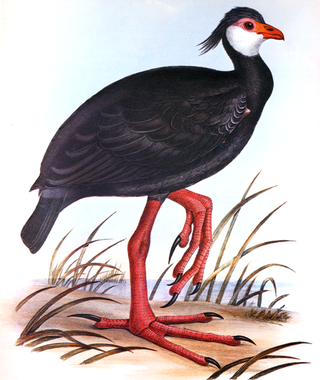
George Robert Gray was an English zoologist and author, and head of the ornithological section of the British Museum, now the Natural History Museum, in London for forty-one years. He was the younger brother of the zoologist John Edward Gray and the son of the botanist Samuel Frederick Gray.

Heteropteryx is a monotypic genus of stick insects containing Heteropteryx dilatata as the only described species. and gives its name to the family of the Heteropterygidae. Their only species may be known as jungle nymph, Malaysian stick insect, Malaysian wood nymph, Malayan jungle nymph, or Malayan wood nymph and because of their size it is commonly kept in zoological institutions and private terrariums of insect lovers. It originates from the Malay Archipelago and is nocturnal.

The Phasmatidae are a family of the stick insects. They belong to the superfamily Anareolatae of suborder Verophasmatodea.
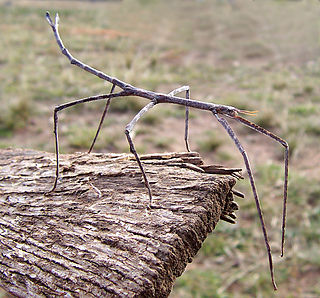
Ctenomorpha marginipennis, the margin-winged stick insect, is a species of stick insect endemic to southern Australia. The species was first described by George Robert Gray in 1833.

Empis digramma is a species of dance flies, in the fly family Empididae. It is included in the subgenus Xanthempis. The thorax is gray with yellowish sides, with two dark stripes following the line of the dorsocentral bristles. Abdomen is gray upper and yellowish on the sides. The fly's length is 5–7.5 millimetres (0.2–0.3 in).
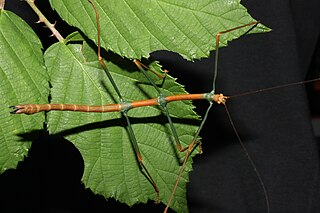
Lonchodes is a genus of stick insects in the family Phasmatidae and the type genus of the family Lonchodidae and tribe Lonchodini. Species have a known distribution that includes tropical Asia and the Pacific.
Prisomera spinicollis is a species of phasmid or stick insect of the genus Prisomera. It is found in Sri Lanka.

Pachymorphinae is a subfamily of stick insects in the family Phasmatidae. Genera are primarily found in Africa, Asia and Australia.

Pylaemenes is a genus of stick insects in the family Heteropterygidae and subfamily Dataminae. It combines small to medium-sized, often brightly colored Phasmatodea species. Their representatives are found in large parts of Southeast Asia.

The Gratidiini are a tribe of stick insects based on the type genus Clonaria and first used by Cliquennois in 2005. Genera are known to be distributed in: Africa, Europe, temperate and tropical Asia and various Pacific Islands.
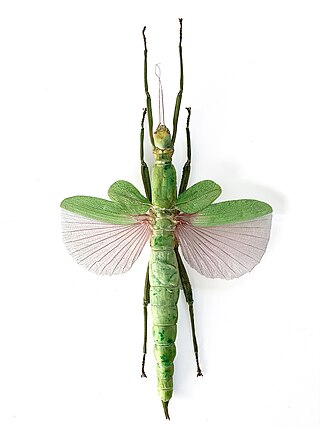
Platycrana is the type genus of the reconstituted subfamily Platycraninae: which are stick insects from the Asia-Pacific region. They belong to the monotypic tribe PlatycraniniBrunner von Wattenwyl, 1893.

Hoploclonia is the only genus of the tribe Hoplocloniini and brings together relatively small and darkly coloured Phasmatodea species.

Brasidas is a genus that is native to the Philippines and is named after the Spartan general Brasidas
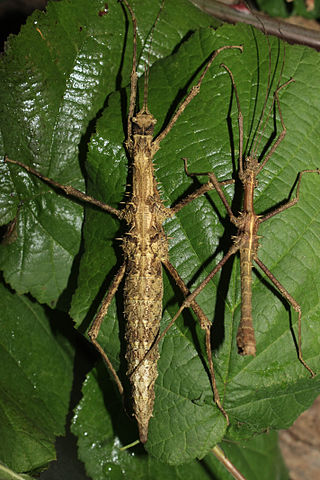
Obrimus is a stick insect genus native to the Philippines. It is type genus for the tribe and the subfamily in which it is listed.

The Cladomorphinae are a subfamily of stick insects in the family Phasmatidae. This taxon is particularly well represented in the Neotropical region, but records also exist for Madagascar, Java and the Maluku Islands.

Orestes mouhotii is an insect species belonging to the order of Phasmatodea. Because of its synyonym Orestes verruculatus, it is the type species of the genus Orestes. Because of its compact body shape, the species is sometimes referred to as small cigar stick insect.

Hoploclonia gecko is a relatively small, spiny and darkly colored stick insect species that is native to the northwest of Borneo.

Heterocopus is a monotypic stick insect genus, containing Heterocopus leprosus as the only valid species.
Presbistus is a genus of Asian stick insects in the tribe Aschiphasmatini, erected by William Forsell Kirby in 1896. Species currently have a known distribution in: India, Cambodia, Borneo, Java and Sumatra.
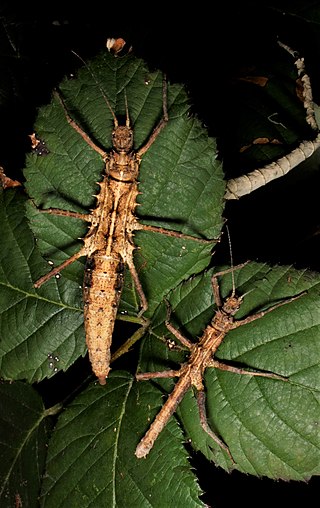
Tisamenus draconina is a species of stick insect in the family Heteropterygidae native to the Philippines.

















